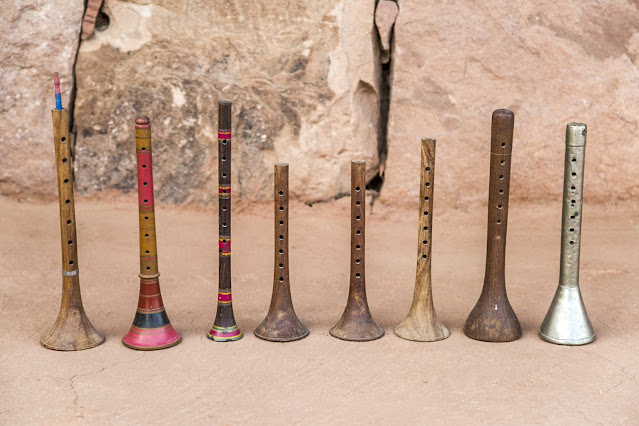Detailed study of folk music, folk instruments and performers of various regions in India
India has a rich and diverse tradition of folk music and
instruments, with each region having its own unique style and genre. Here is a
brief overview of some of the popular folk music and instruments of various
regions in India:
- Bengal: Baul is a popular genre of folk music in Bengal that is characterized by its simple melodies, devotional lyrics, and the use of a string instrument called the ektara. Baul singers, known as Bauls, often sing about love, spirituality, and the search for truth.
- Punjab: Bhangra is a high-energy folk dance from Punjab that is accompanied by music played on traditional instruments such as the dhol (drum), dafli (hand drum), and tumbi (string instrument). Bhangra is typically performed during the harvest festival of Baisakhi and is now widely popular in India and around the world.
- Rajasthan: The folk music of Rajasthan is characterized by the use of instruments such as the sarangi (string instrument), algoza (double flute), and harmonium (pump organ). Rajasthani folk music is often performed by traveling minstrels, known as Langa and Manganiyar, who sing songs about daily life, love, and spirituality.
- Maharashtra: Lavani is a popular genre of folk music in Maharashtra that is typically performed by female dancers to the accompaniment of a dholki (drum) and harmonium. Lavani songs often deal with social and political issues and are known for their fast beats and sensual lyrics.
- Andhra Pradesh: The folk music of Andhra Pradesh is characterized by the use of instruments such as the tambura (string instrument) and the mridangam (drum). The traditional folk music of Andhra Pradesh is often performed by traveling minstrels, known as Burrakatha, who sing stories and songs about Hindu gods and goddesses.
There are many other regions in India with rich and diverse
traditions of folk music and instruments, including Uttar Pradesh, Madhya
Pradesh, and Kerala, to name a few. The traditions of folk music and
instruments in India continue to be celebrated and passed down from generation
to generation, preserving the country's rich cultural heritage.
What are the different types of Indian folk music
India has a rich and diverse tradition of folk music, with
many different types of music found throughout the country. Here are a few of
the major types of Indian folk music:
- Bhakti: Bhakti is devotional music that is characterized by its emotional and spiritual lyrics. Bhakti music is often performed as a form of worship, and can be found in many different regions in India, including Bengal, Punjab, and Rajasthan.
- Sufi: Sufi music is a form of devotional music that originated in the Islamic world but has a strong tradition in India as well. Sufi music often features the use of poetry and song to express devotion to God and the search for inner peace and spiritual enlightenment.
- Baul: Baul is a form of folk music that is found in Bengal and is characterized by its simple melodies, devotional lyrics, and the use of a string instrument called the ektara. Baul music often expresses themes of love, spirituality, and the search for truth.
- Bhangra: Bhangra is a high-energy folk dance and music form from Punjab that is characterized by its fast beats and celebratory lyrics. Bhangra music is typically performed with the dhol (drum), dafli (hand drum), and tumbi (string instrument).
- Lavani: Lavani is a popular form of folk music from Maharashtra that is often performed by female dancers to the accompaniment of a dholki (drum) and harmonium. Lavani songs are known for their fast beats and sensual lyrics, and often deal with social and political issues.
- Ghazal: Ghazal is a form of Urdu poetry that has been set to music, and is often performed as a form of devotional music in India. Ghazal music is characterized by its sophisticated lyrics, intricate melody, and use of instruments such as the harmonium and tabla.
These are just a few of the many different types of Indian folk
music, each of which reflects the unique cultural traditions and experiences of
a particular region or community.
What are the folk instruments of India
India has a rich tradition of folk instruments, with each
region having its own unique instruments that are used to accompany the local
style of folk music. Here are some of the most popular folk instruments of
India:
- Ektara: A string instrument that is played with one hand and is a staple of Baul music in Bengal.
- Dhol: A double-headed drum that is used in Bhangra music in Punjab and other parts of India.
- Sarangi: A string instrument that is played with a bow and is commonly used in Rajasthani folk music.
- Algoza: A double flute that is used in the folk music of Rajasthan and other regions.
- Harmonium: A pump organ that is used in many forms of Indian classical and folk music, including Bhakti, Sufi, and Baul music.
- Dafli: A hand-held drum that is used in Bhangra music in Punjab and other parts of India.
- Tumbi: A single-string instrument that is used in Bhangra music in Punjab and other regions.
- Tambura: A long-necked string instrument that is used in classical and folk music throughout India.
- Mridangam: A barrel-shaped drum that is used in classical and folk music in South India, particularly in the state of Andhra Pradesh.
- Dholki: A small, goblet-shaped drum that is used in Lavani music in Maharashtra and other parts of India.
These are just a few of the many folk instruments that are
used in India, and the list is by no means exhaustive. Each region in India has
its own unique tradition of instruments and musical styles, reflecting the rich
cultural diversity of the country.
What is the importance of folk music in India
Folk music plays an important role in the cultural and social
life of India, serving as a reflection of the country's diverse history,
traditions, and communities. Here are some of the reasons why folk music is
important in India:
- Cultural Identity: Folk music reflects the unique cultural identity of each region in India, preserving the traditions and customs of local communities and serving as a symbol of the country's rich cultural heritage.
- Social Significance: Folk music is often tied to important social and religious events, such as weddings, festivals, and religious ceremonies. It serves as a means of celebration, expression, and bonding within communities.
- Historical Record: Folk music serves as a historical record of the experiences and traditions of different communities in India, providing a window into the country's past and preserving its cultural heritage for future generations.
- Musical Diversity: India is home to a rich and diverse tradition of folk music, reflecting the country's diverse cultural and geographic landscape. The wide variety of styles and instruments found in Indian folk music helps to create a unique and dynamic musical landscape.
- Economic Benefits: Folk music can also play an important role in the local economy, providing livelihoods for musicians and supporting the production and sale of traditional instruments.
Overall, folk music is an integral part of India's cultural
and social fabric, serving as a source of identity, celebration, and historical
preservation.
Who is the father of folk music
There is no one person who can be considered the "father
of folk music." Folk music has roots in the oral traditions of communities
around the world and has evolved over many centuries. The term "folk
music" generally refers to music that is passed down through generations
by word of mouth, rather than being written and published. The origins of folk
music are therefore complex and varied, reflecting the diverse cultural and
musical traditions of different communities.
However, certain individuals have played important roles in
popularizing and preserving folk music, such as American folklorist Alan Lomax,
who recorded and documented traditional music from around the world, and Pete
Seeger, who helped revive American folk music in the 20th century through his
concerts, recordings, and political activism.
ALSO READ:-
- Folk Music Origin, evolution and classification of Indian folk song / music
- A.K. Ramanujan
- Sri Aurobindo Ghosh
Whatsapp :- 8130208920
Youtube :- Myexamsolution








0 comments:
Note: Only a member of this blog may post a comment.